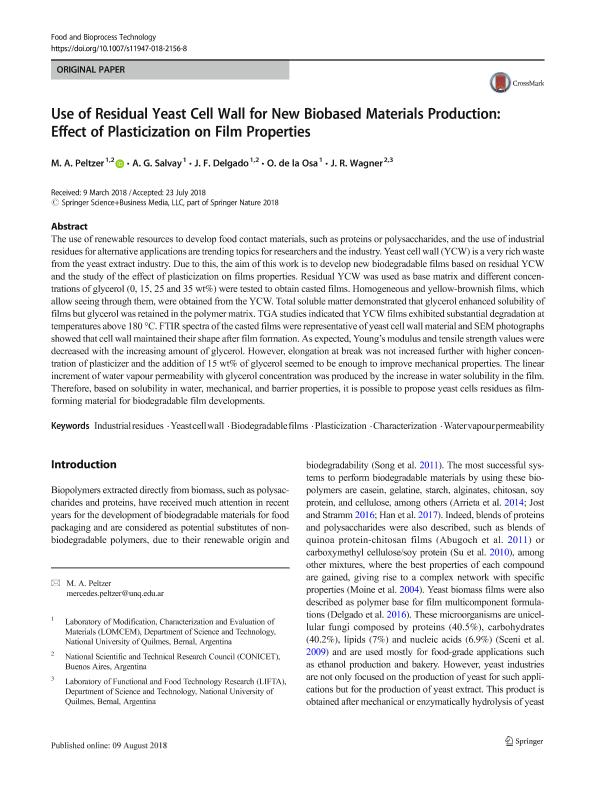Mostrar el registro sencillo del ítem
dc.contributor.author
Peltzer, Mercedes Ana

dc.contributor.author
Salvay, A.G.
dc.contributor.author
Delgado, Juan Francisco

dc.contributor.author
de la Osa, Orlando

dc.contributor.author
Wagner, Jorge Ricardo

dc.date.available
2020-03-05T18:25:28Z
dc.date.issued
2018-11
dc.identifier.citation
Peltzer, Mercedes Ana; Salvay, A.G.; Delgado, Juan Francisco; de la Osa, Orlando; Wagner, Jorge Ricardo; Use of Residual Yeast Cell Wall for New Biobased Materials Production: Effect of Plasticization on Film Properties; Springer; Food and Bioprocess Technology; 11; 11; 11-2018; 1995-2007
dc.identifier.issn
1935-5130
dc.identifier.uri
http://hdl.handle.net/11336/98853
dc.description.abstract
The use of renewable resources to develop food contact materials, such as proteins or polysaccharides, and the use of industrial residues for alternative applications are trending topics for researchers and the industry. Yeast cell wall (YCW) is a very rich waste from the yeast extract industry. Due to this, the aim of this work is to develop new biodegradable films based on residual YCW and the study of the effect of plasticization on films properties. Residual YCW was used as base matrix and different concentrations of glycerol (0, 15, 25 and 35 wt%) were tested to obtain casted films. Homogeneous and yellow-brownish films, which allow seeing through them, were obtained from the YCW. Total soluble matter demonstrated that glycerol enhanced solubility of films but glycerol was retained in the polymer matrix. TGA studies indicated that YCW films exhibited substantial degradation at temperatures above 180 °C. FTIR spectra of the casted films were representative of yeast cell wall material and SEM photographs showed that cell wall maintained their shape after film formation. As expected, Young’s modulus and tensile strength values were decreased with the increasing amount of glycerol. However, elongation at break was not increased further with higher concentration of plasticizer and the addition of 15 wt% of glycerol seemed to be enough to improve mechanical properties. The linear increment of water vapour permeability with glycerol concentration was produced by the increase in water solubility in the film. Therefore, based on solubility in water, mechanical, and barrier properties, it is possible to propose yeast cells residues as film-forming material for biodegradable film developments.
dc.format
application/pdf
dc.language.iso
eng
dc.publisher
Springer

dc.rights
info:eu-repo/semantics/openAccess
dc.rights.uri
https://creativecommons.org/licenses/by-nc-sa/2.5/ar/
dc.subject
BIODEGRADABLE FILMS
dc.subject
CHARACTERIZATION
dc.subject
INDUSTRIAL RESIDUES
dc.subject
PLASTICIZATION
dc.subject
WATER VAPOUR PERMEABILITY
dc.subject
YEAST CELL WALL
dc.subject.classification
Recubrimientos y Películas

dc.subject.classification
Ingeniería de los Materiales

dc.subject.classification
INGENIERÍAS Y TECNOLOGÍAS

dc.title
Use of Residual Yeast Cell Wall for New Biobased Materials Production: Effect of Plasticization on Film Properties
dc.type
info:eu-repo/semantics/article
dc.type
info:ar-repo/semantics/artículo
dc.type
info:eu-repo/semantics/publishedVersion
dc.date.updated
2020-03-05T14:57:48Z
dc.journal.volume
11
dc.journal.number
11
dc.journal.pagination
1995-2007
dc.journal.pais
Alemania

dc.journal.ciudad
Berlin
dc.description.fil
Fil: Peltzer, Mercedes Ana. Consejo Nacional de Investigaciones Científicas y Técnicas; Argentina. Universidad Nacional de Quilmes. Departamento de Ciencia y Tecnología; Argentina
dc.description.fil
Fil: Salvay, A.G.. Universidad Nacional de Quilmes. Departamento de Ciencia y Tecnología; Argentina
dc.description.fil
Fil: Delgado, Juan Francisco. Universidad Nacional de Quilmes. Departamento de Ciencia y Tecnología; Argentina. Consejo Nacional de Investigaciones Científicas y Técnicas; Argentina
dc.description.fil
Fil: de la Osa, Orlando. Universidad Nacional de Quilmes. Departamento de Ciencia y Tecnología; Argentina
dc.description.fil
Fil: Wagner, Jorge Ricardo. Universidad Nacional de Quilmes. Departamento de Ciencia y Tecnología; Argentina. Consejo Nacional de Investigaciones Científicas y Técnicas; Argentina
dc.journal.title
Food and Bioprocess Technology

dc.relation.alternativeid
info:eu-repo/semantics/altIdentifier/url/http://link.springer.com/10.1007/s11947-018-2156-8
dc.relation.alternativeid
info:eu-repo/semantics/altIdentifier/doi/http://dx.doi.org/10.1007/s11947-018-2156-8
Archivos asociados
